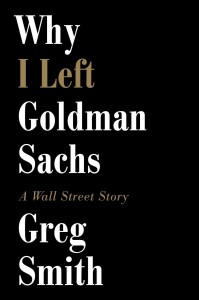Why I Left Goldman Sachs
by Greg Smith, 2012
This book, which grew out of a New York Times editorial, chronicles one man’s experience at the investment bank Goldman Sachs from around 2000 to 2012. It details Greg’s rise from lowly intern to vice president. Though, let’s not get ahead of ourselves here, Goldman Sachs gives out the title Vice President to thousands of employees. Greg felt the need to write the book to tell the world how far the values and humanity of Wall Street have fallen. No longer are investment banks looking out for their customer’s interests. Instead, they claim no responsibility for the customer’s actions, and they constantly attempt to market structured products to the customer that promise big commissions for the Wall Street firm.
I have never liked finance. I’ve never seen the appeal in working in an industry that moves money around in an effort to make the money reproduce. A lot of the financial industry seems intentionally deceptive to the interested outsider. This semester, I took a course in Asset Pricing Theory to get a grasp on the terminology in the finance field. It also fulfilled a breadth requirement that I have as a PhD student in the business school. This book and class confirmed my distrust and dislike of finance. The course alluded to the practice of creating complicated derivative investments meant to be difficult to price and track. The book confirmed this practice, and it told how Wall Street employees focus on trying to sell these “assets” to customers. The banks no longer feel the need to look out for their customers (if they ever did in the first place) and are only interested in their own bottom line.
It’s sad how much money these firms and their employees make. The allure of getting rich “out-smarting” other people on Wall Street is constantly stealing brilliant mathematicians/physicists/statisticians/etc. from useful work to work in hedge funds, investment banks, and as day-trading quants. Just last week, I was told that my friend’s husband, who is a Physics PhD, is thinking of working for a hedge fund instead of working in physics post-graduation. Finance is an arms race to have the best mathematical models. However, I don’t see a lot of spillover good from the development of these financial models to more useful fields. It’s an arms race for its own sake, and it’s a shame that so many brilliant people get caught up in it.
Bottom line: This book is a good choice if you want to learn a bit about the values of Wall Street. I also used it to get familiar with some of the financial terminology, in case it is relevant to my studies in the business school. I listened to the audio tape.
